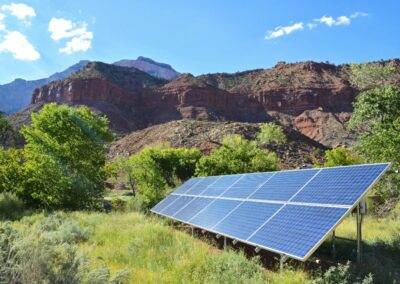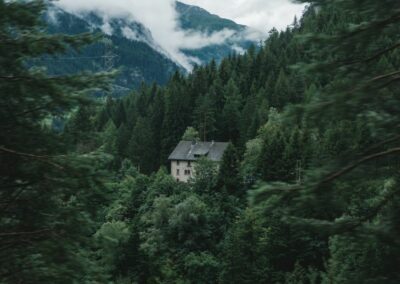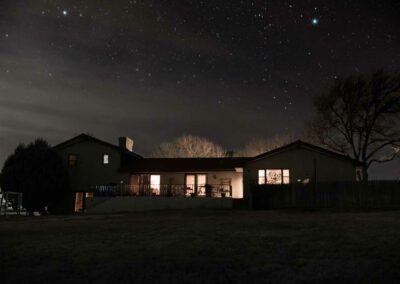If you’re living off-grid and not connected to any main supplies, how is it possible to work online, record live videos and have super-fast off-grid internet?
Some people might say that living off-grid and having a fast internet connection must mean that you are in some way connected to mains supplies – and that’s “cheating.”
But a good internet connection is essential for us and for others who are making a living online. We don’t (just) use it for things like gaming, and we’re not addicted to Facebook (at least, most of us aren’t) – the internet is our JOB.
I help entrepreneurs from all over the world to grow an online business, and that means that 95% of my business is online. For me, having a fast and reliable connection is not just a plus; it’s a necessity.
One of the questions I’m asked most frequently is, “how do you even get internet when you’re living off-grid, away from any public supply lines?”
Read on to find out how we managed to set up our internet, and how you can do it too, or watch the video below if you prefer to hear me talking about it!
Looking For Internet Off-Grid
So how did we set up our connection in the first place? Making sure we had reliable internet access wasn’t an afterthought – we didn’t buy our land and then consider the possibilities. One of the first things we looked at when we were searching for a piece of land to move off-grid was how we could get access to the world wide web.
When we were visiting properties in the search for a place to build our new home, we were constantly using our phones to check that our potential new property had stable 3G access (that was a while ago, before the arrival of 4G.)
I needed to be sure I could access the web even if there was a problem with the WiFi connection, and I wanted to be able to access it at any time. Not just in the morning or evening or whenever we could pick up a WiFi signal from somewhere, but at any time of day.
Finding A Way To Bring The Internet Into Our Home
Once we had found the perfect location (where we ended up building our home) and were sure we had a strong 3G signal there, our next step was to research different ways to get the internet into our house.
When we started asking around, we discovered that most of the people living here had satellite internet, which not only cost quite a lot of money it was also limited. When staying at a hostel once, the hosts were reluctant to give us their WiFi code, because their plan was limited to a couple of gigabytes per month. Streaming or downloading something with limited internet would mean that most of those gigabytes would be used up pretty quickly, and the hosts (or us if we chose this option) would be out of internet for the rest of the month.
Since then, things have changed, and satellite offerings have become cheaper with the option of having unlimited internet – so don’t rule out that option completely! If there is really no way of getting access to 3G or 4G, satellite internet might be the best choice for you.
Line Of Sight Internet – The Perfect Choice For Us
After a bit more research, we found a better choice to suit us – line-of-sight internet. This gives you wireless over-the-air internet connection if you have a clear line of sight to an internet supply mast that’s unobstructed by trees or other buildings. We can see the antenna from our house, which makes this type of connection the perfect option for us.
For us, this is the most cost-effective and simplest way to get super-fast internet living off-grid. It doesn’t involve any wire installation or connecting to satellite internet. We pay €20 euros a month and get the fast, reliable internet connection that we need.
(In case you’re wondering and are living around here, we’re with ePorts in Tortosa – and it was installed by Ramon Sabate in Horta de Sant Joan. We’d highly recommend working with him!)
Possible Issues With Line-Of-Sight Internet
The connection we have rarely fails. Every few months or so, someone might need to get work done down the line, but when whole villages seem to lose internet access after a big storm, ours is usually still going strong.
On the whole, it’s at least as reliable as our connection was back in Belgium or the Netherlands. And as an extra perk, we don’t need to worry about how much we use it!
The only issue we encounter is that the connection gets a bit slow during major holidays in the region – long weekends, big festivities etc. That’s because we live in a tourist area, and when lots of visitors arrive and connect to the internet all at the same time, they use a lot of the bandwidth, leading to slow internet.
To minimise stress during this time, I usually plan around these holidays. Knowing these dates in advance allows me to schedule my important client calls and work meetings not to fall on those days.
Other than that, the internet we have works perfectly. I can have live video calls and hold meetings with multiple callers with everything working just fine – even while the man of the house is streaming football or watching YouTube at the same time.
Other Options For Off-Grid Internet
We know there are other internet options available for people living off-grid in Spain, everything from mobile signal enhancers to new techniques that pop up every year. I’m pretty sure line-of-sight internet wouldn’t be your only choice if you’re facing this challenge.
(I’m just not very well placed to write about it!)
What Kind Of Internet Are You Using?
I hope this has helped with answering the question of where we get our internet from.
It’s over to you now – if you’re living off-grid or somewhere internet connection is an issue, what kind of internet do you use? Do you have any suggestions on other ways to get a great connection that I haven’t mentioned?
Or if you have any questions about the type of internet we have, feel free to ask us in the comments below!









0 Comments